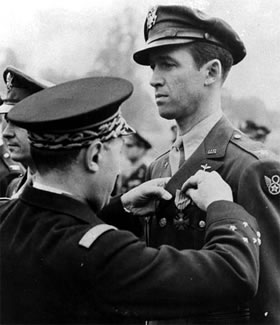 Mallory gave me a biography on Jimmy Stewart ("James Stewart: A Biography" by Marc Eliot) for my birthday, over the holidays, and between my Adobe Production Suite obsession and various celebrations, I've been checking in on Jimmy every few days. Eliot doesn't appear to understand the faith life of Presbyterians, (and he assumes no one else will either), but the sheer weight of Stewart's life is impressive: two of his grandfathers served the Union in the Civil War, one of them commissioned a brigadier general by Ulysses Grant; Jimmy's dad ran a thriving hardware store business but left it to volunteer for World War I, at the age of 40; Jimmy's introduction to theater was through music, and his first roles were made possible due to a theatrical convention of the time--they needed an accord ian player; Jimmy attended, and graduated from, Princeton, at a time when there were no coeds on campus; he was attracted to theater, not because he saw acting as a career, but because it might have given him a chance to get close to Margaret Sullivan; at first, he was considered too tall and gangly and slow-talking to be a leading man, but there was something about him that stole the show every time; he could be on stage for a single line and he would be remembered, and singled out by critics, as a bright spot in otherwise failed productions. I have not yet reached World War II in the book, but it's common knowledge that he flew dangerous bombing missions over Berlin, and was decorated for his service, at a time when he could very easily have charted a less troubling course and enjoyed the creature comforts of a matinee idol. His humility about his soldiering was well represented in the George Bailey role he played in "It's a Wonderful Life." He had led a life of surpassing accomplishment, and yet he always played someone who was still trying to figure it all out.
Mallory gave me a biography on Jimmy Stewart ("James Stewart: A Biography" by Marc Eliot) for my birthday, over the holidays, and between my Adobe Production Suite obsession and various celebrations, I've been checking in on Jimmy every few days. Eliot doesn't appear to understand the faith life of Presbyterians, (and he assumes no one else will either), but the sheer weight of Stewart's life is impressive: two of his grandfathers served the Union in the Civil War, one of them commissioned a brigadier general by Ulysses Grant; Jimmy's dad ran a thriving hardware store business but left it to volunteer for World War I, at the age of 40; Jimmy's introduction to theater was through music, and his first roles were made possible due to a theatrical convention of the time--they needed an accord ian player; Jimmy attended, and graduated from, Princeton, at a time when there were no coeds on campus; he was attracted to theater, not because he saw acting as a career, but because it might have given him a chance to get close to Margaret Sullivan; at first, he was considered too tall and gangly and slow-talking to be a leading man, but there was something about him that stole the show every time; he could be on stage for a single line and he would be remembered, and singled out by critics, as a bright spot in otherwise failed productions. I have not yet reached World War II in the book, but it's common knowledge that he flew dangerous bombing missions over Berlin, and was decorated for his service, at a time when he could very easily have charted a less troubling course and enjoyed the creature comforts of a matinee idol. His humility about his soldiering was well represented in the George Bailey role he played in "It's a Wonderful Life." He had led a life of surpassing accomplishment, and yet he always played someone who was still trying to figure it all out. They don't make many like him!
Farm News & Planning
Over the last few years, we've made a concerted effort to make sure the public knows we're open, (billboards, radio, hotel racks, internet, magazines, you name it), and we've pursued that course because there has been a perception you needed to be part of a group to enjoy the farm. While we're still committed to public hours, it's a daunting task, financially and emotionally, to open up the old homestead on, say, a Monday in late December. If you ask me, the farm is worthy of a daily habit, but even our most loyal die-hard customers can't manage that, so.. we're going to try a Wednesday through Saturday public hours schedule during the winter. Keep us in mind for great food, historic retail, and live music on Saturdays. We should be really expensive, but we're a pretty cheap date in these trying times, so put us on your calendar, and by all means, tell us how we can better serve you. (Groups love us--our spring tours are up again this year--but we're still searching for that perfect combination of history-magic and dining value that will make you families at least monthly regulars.)
Time to put on the three cornered thinking cap again...



 Just in case anyone was wondering, I've now taken in three of Michael Sander's Harvard
Just in case anyone was wondering, I've now taken in three of Michael Sander's Harvard  If you have an hour or so to spare, you might want to
If you have an hour or so to spare, you might want to  The first lady took some grief this week, when she claimed her Olympic-pitching trip to Europe would constitute a "sacrifice." According
The first lady took some grief this week, when she claimed her Olympic-pitching trip to Europe would constitute a "sacrifice." According 
